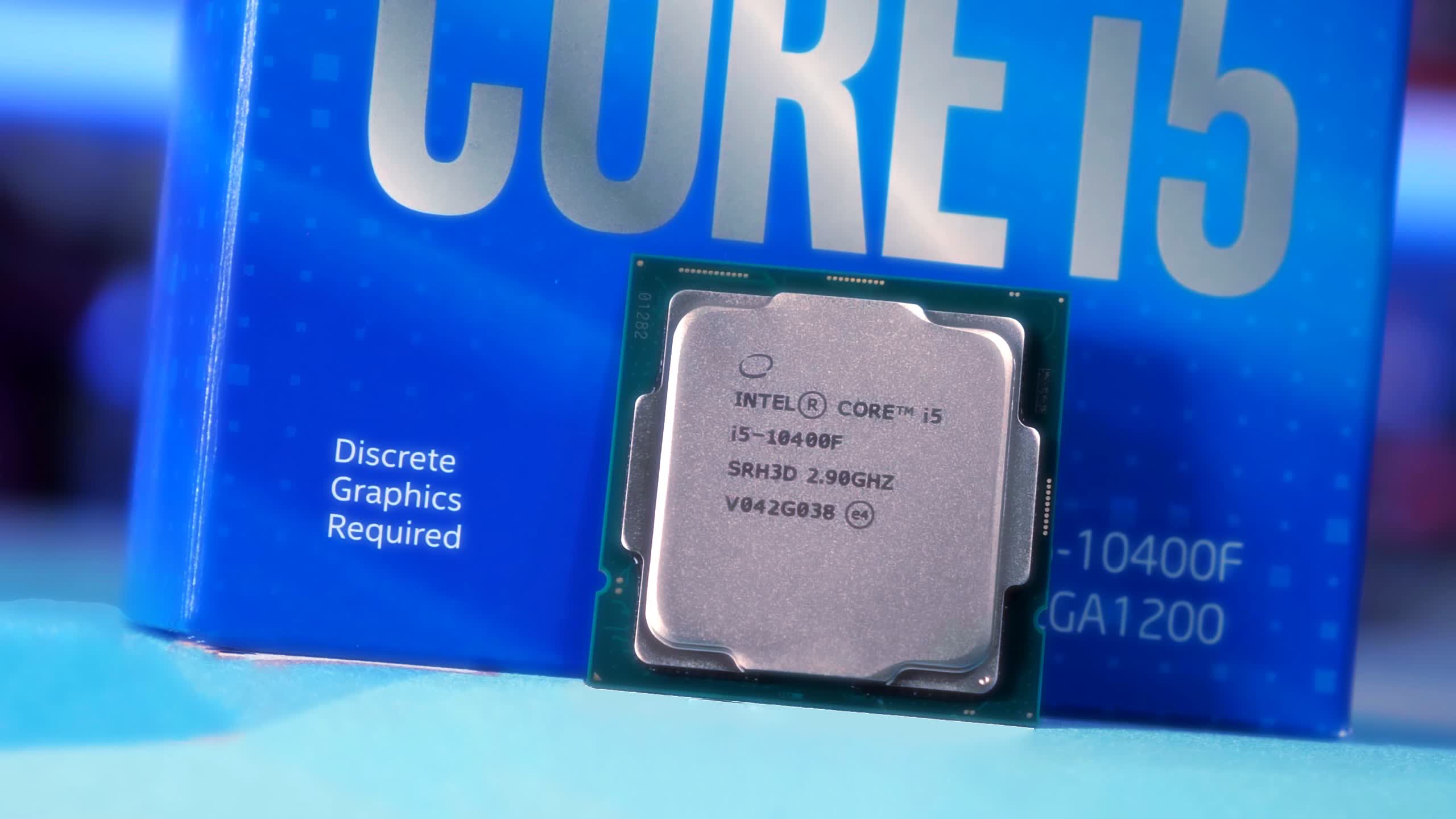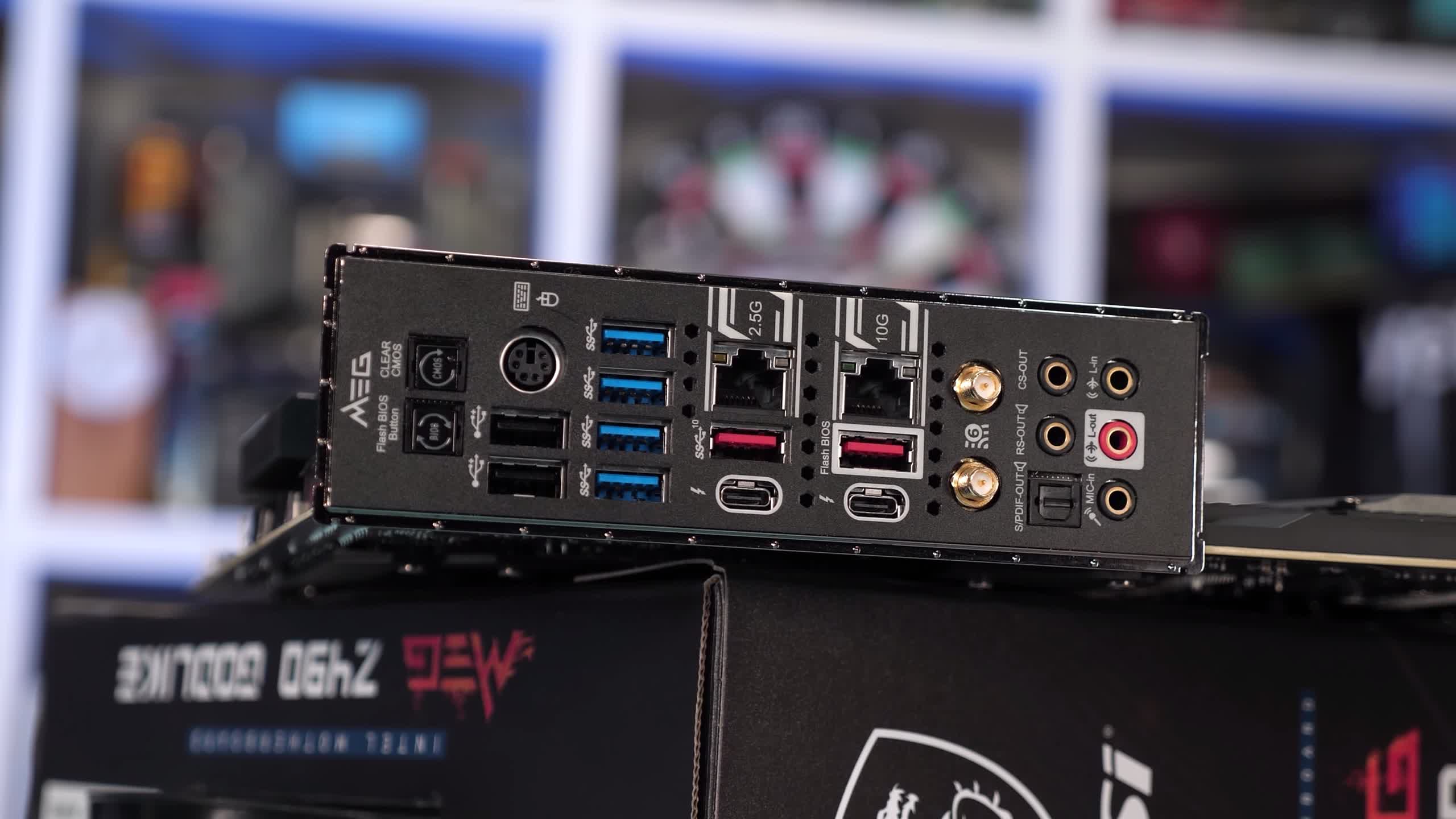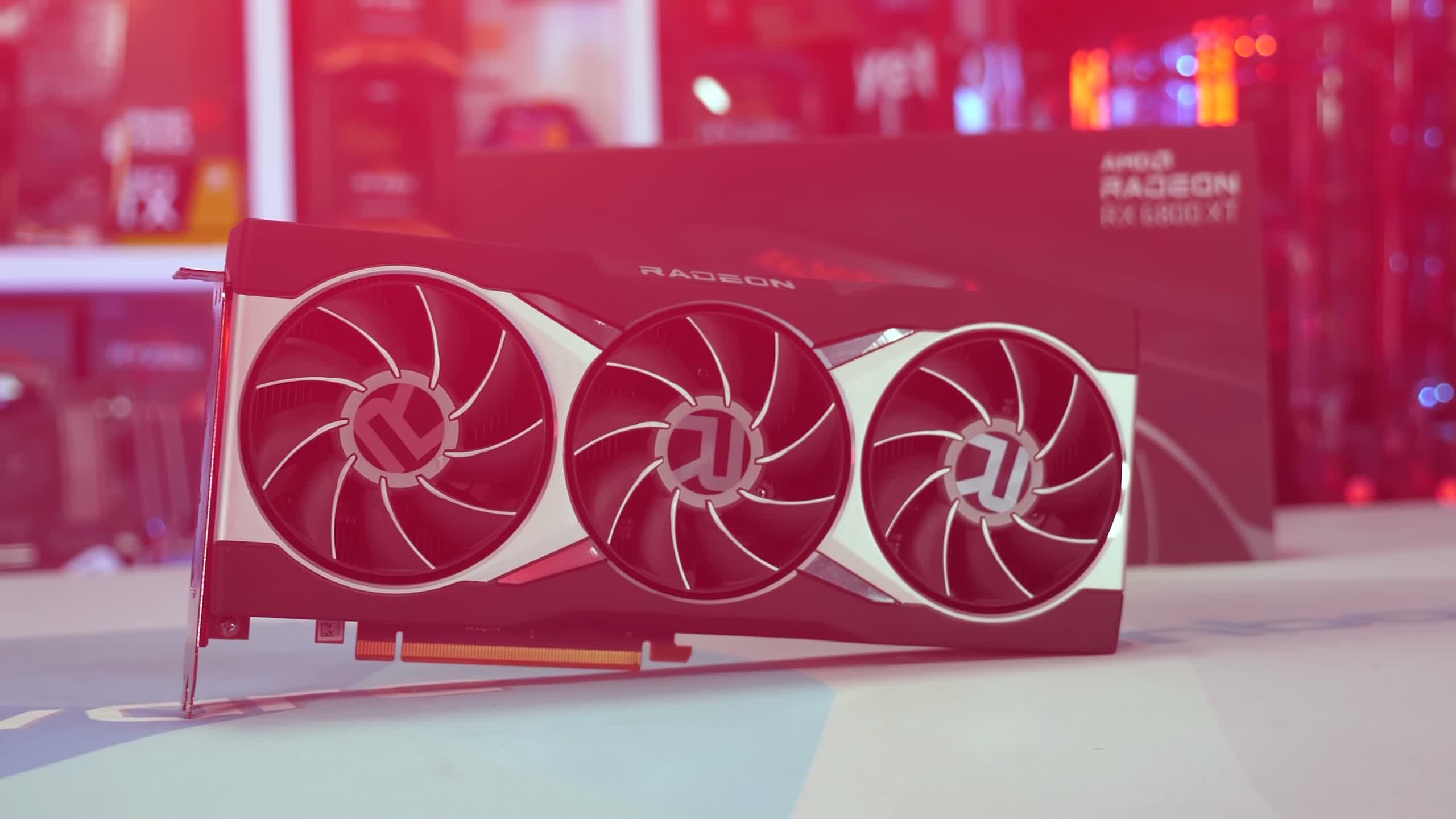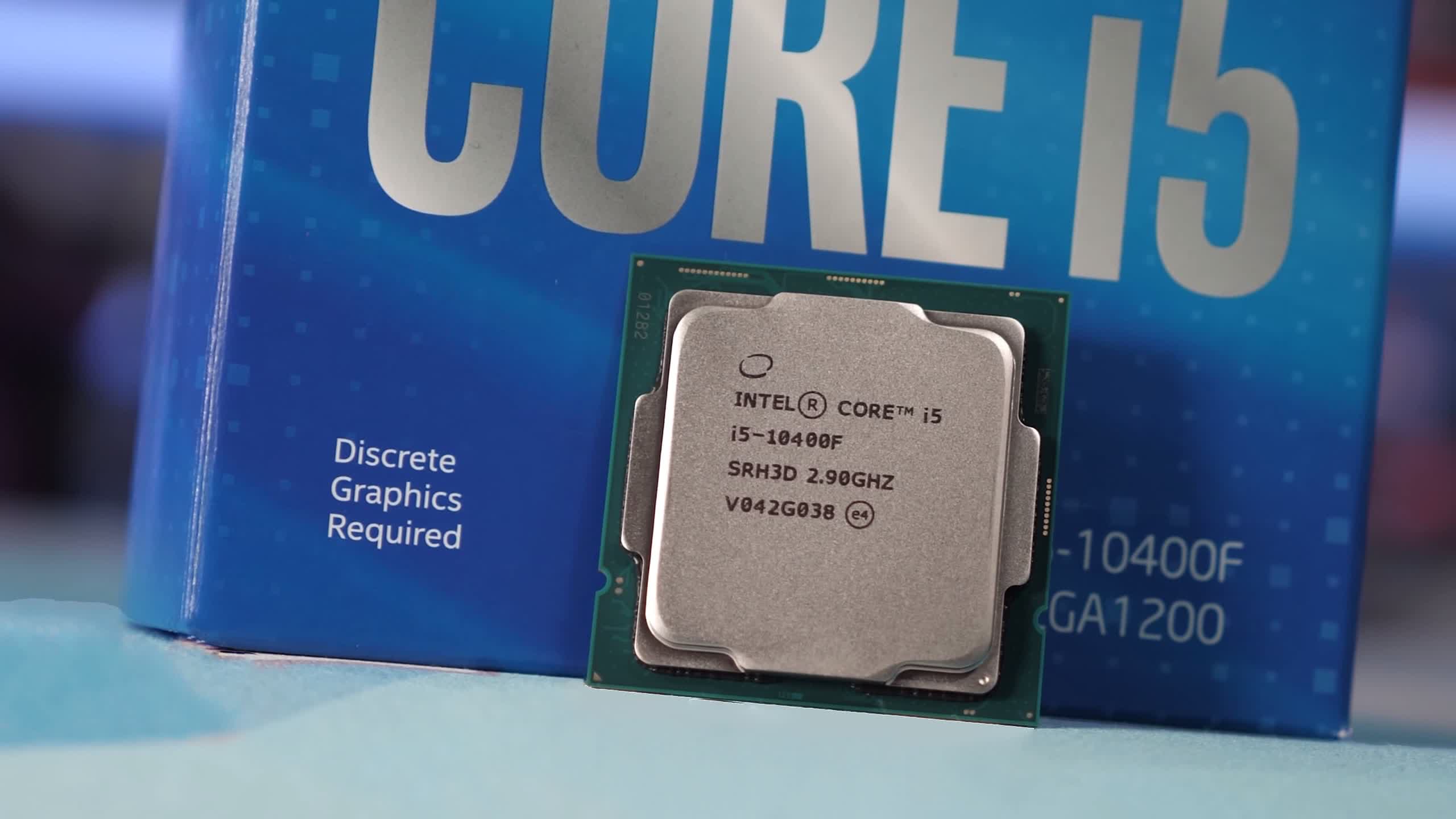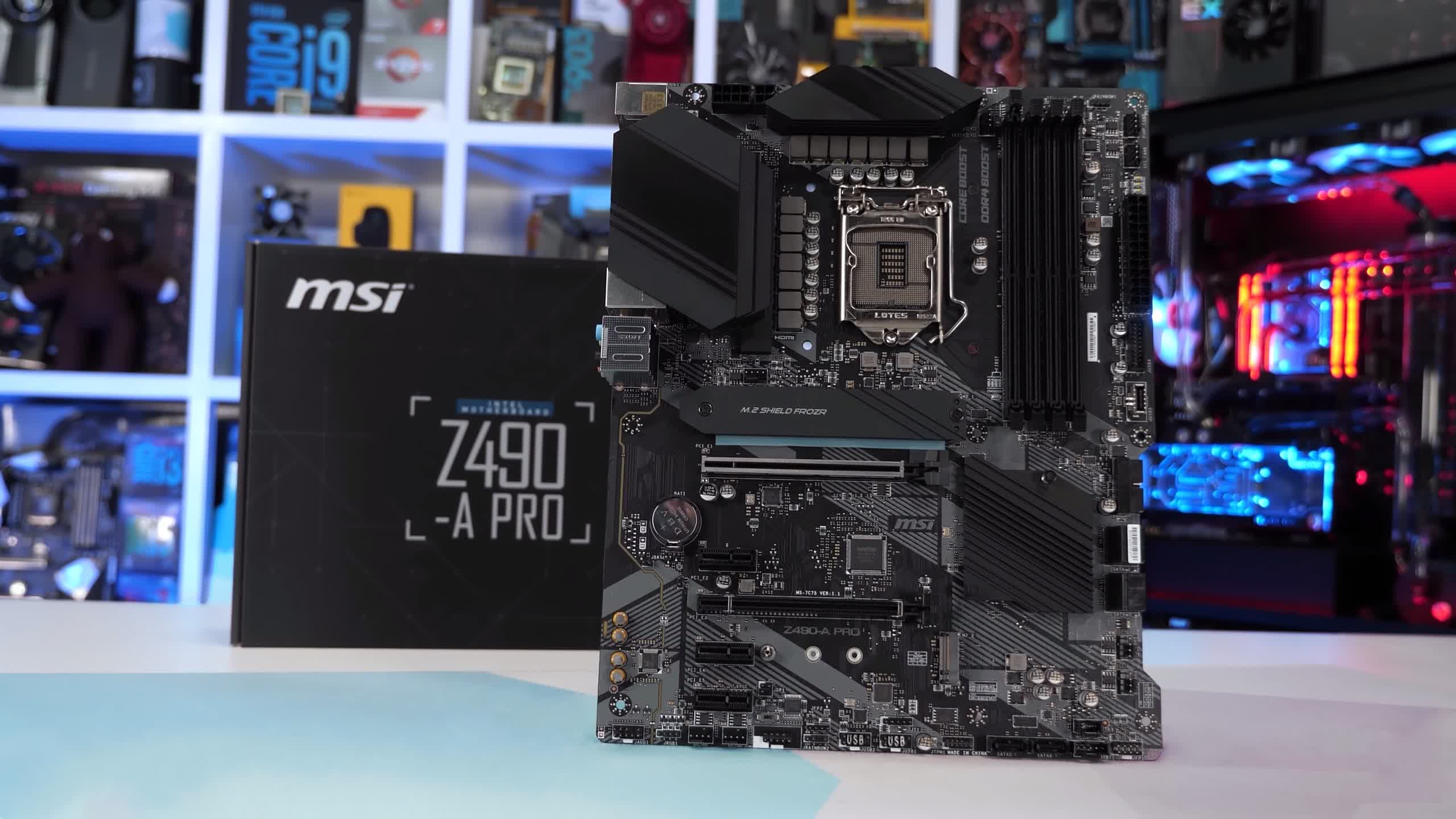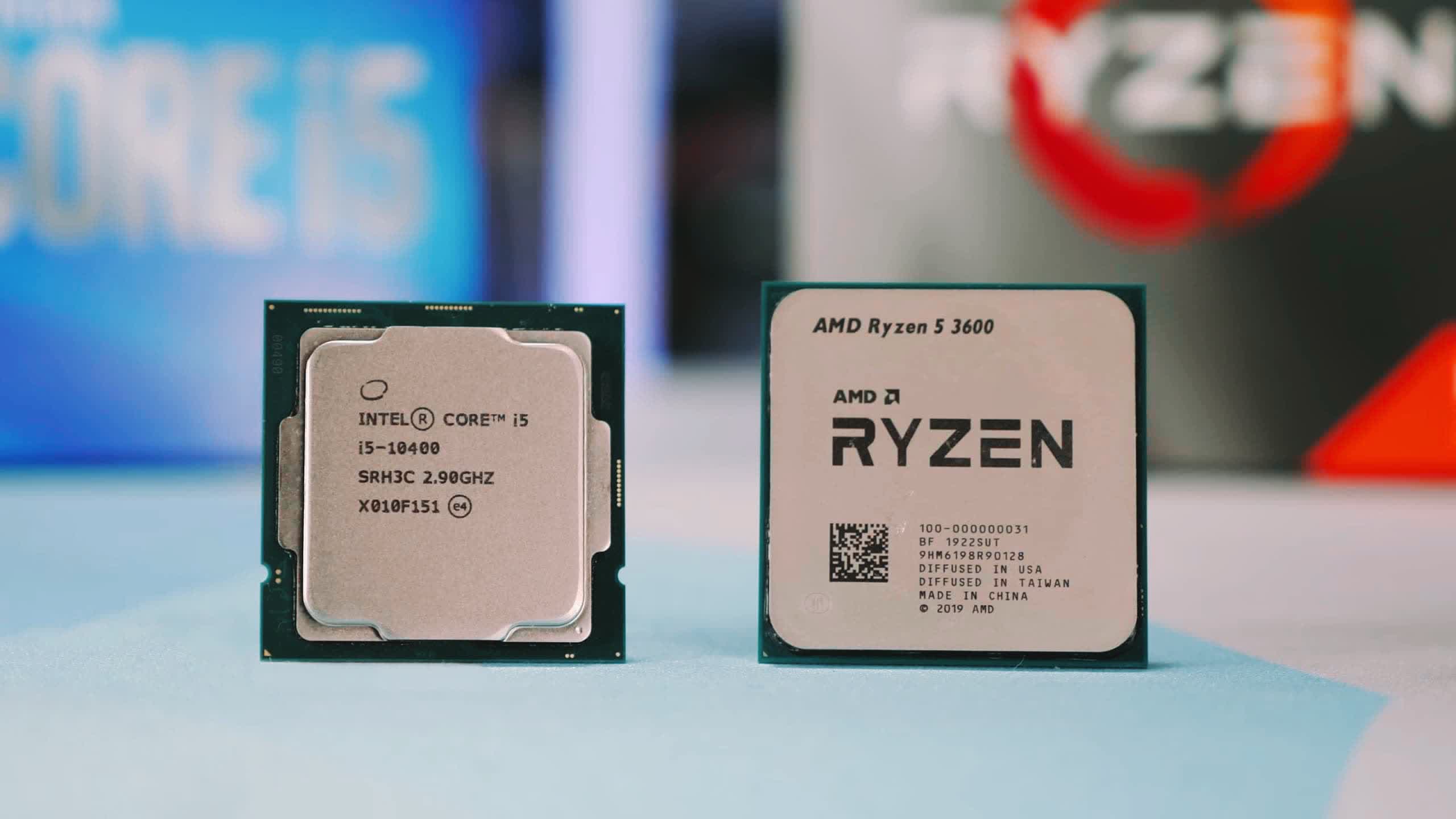Recently we compared AMD's Ryzen 5 3600 to high-end flagship CPUs such as the Core i9-10900K and Ryzen 9 3950X and in a wide range of games using the Radeon RX 6800 GPU and found there's little performance difference at 1440p, so the budget Ryzen part did very well.
In this article, we'll be checking out Intel's Core i5-10400F, a direct competitor to the Ryzen 3600. The more affordable 10400F variant is essentially the same processor we reviewed last year, but drops the integrated graphics. Once again, the idea is to see how this processor performs when paired with a latest-generation high-end GPU.
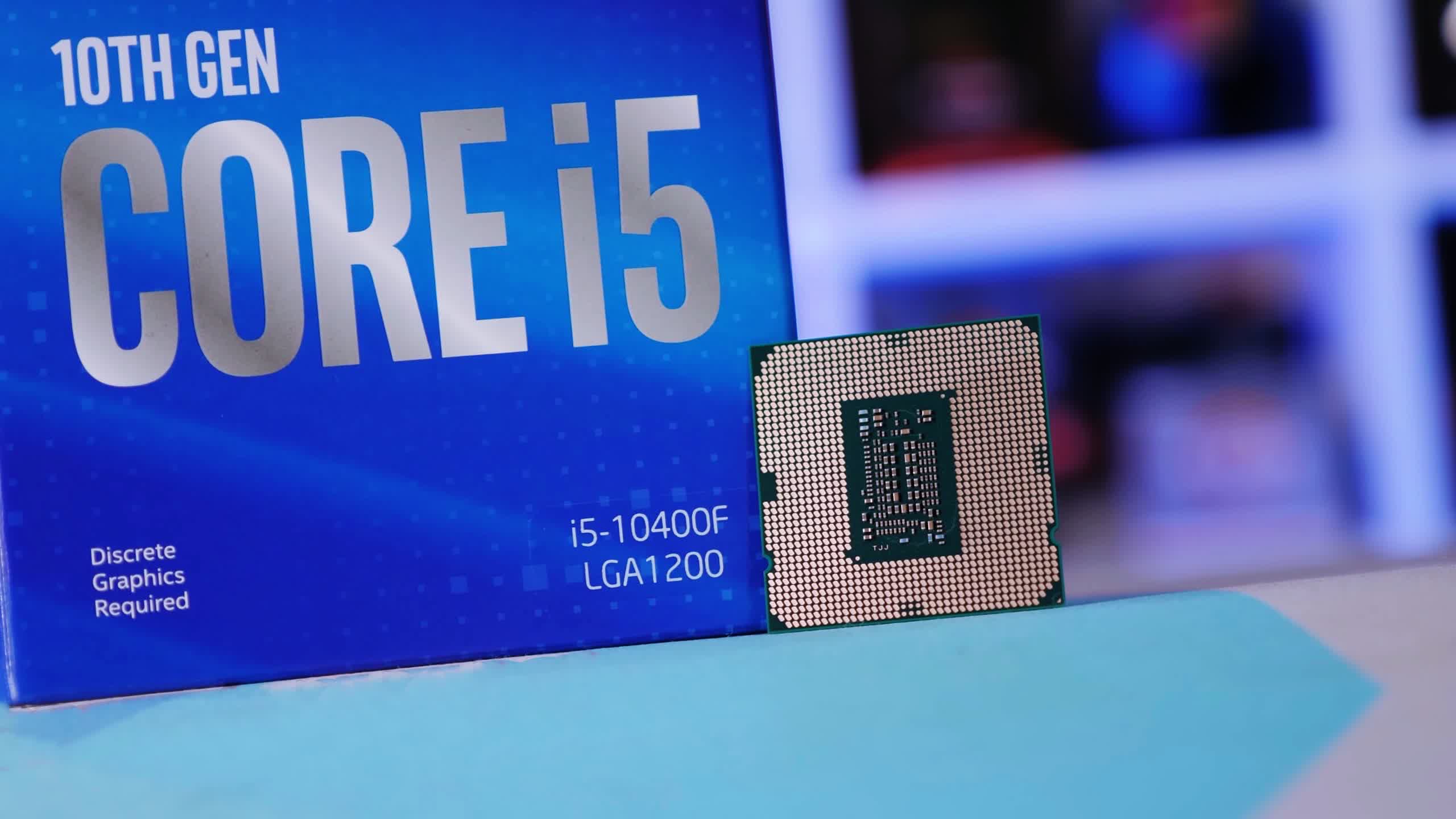
As we noted in the Ryzen test, the R5 3600 isn't as inexpensive as it used to for those looking to build a new PC in early 2021. The CPU is now 18 months old, released at $200 back in mid 2019. Last year we saw it selling for as little as $150, but today it's back up at $200 and sometimes even a little higher.
Meanwhile, Intel is selling the Core i5-10400F for just $166, an interesting role reversal from what we observed months ago. Back then Intel Z490 motherboards were quite costly, while decent AMD B450 boards were relatively inexpensive, making the Ryzen 5 part the better overall deal. In fact, our i5-10400 review conclusion said...
"As for what the immediate future holds, we'd bet the Ryzen 5 3600 will keep selling for $175 or even less, with rumors of a boosted 3600XT coming soon. For Intel to compete in terms of value, it will need to drop the i5-10400 down to ~$150 and of course upcoming Intel B460 boards will have to prove their worth as well. Opening up memory overclocking would certainly help Intel's case as well, this is something they absolutely need to do at this point."
Essentially we said, the Intel CPU needs to be cheaper and guess what, today it's about 17% less expensive. There's a lot more to this comparison and we'll discuss all the pros and cons towards the end of the article, but for now let's see how the 10400F handles the RX 6800 and how that performance compares to the R5 3600 along with high-end parts such as the 10900K.
We're going to look at performance in 21 games running at 1080p, 1440p and 4K using 32GB of DDR4-3200 CL14 memory. We're aware that on more affordable B series boards the 10400F will be limited to DDR4-2666, but for the sake of this comparison we wanted to keep the test hardware as apples to apples as possible.
Please note for DDR4-3200 or faster you will require a Z490 motherboard. Previously we've found up to a 10% performance increase when using DDR4-3200 over 2666 with Intel CPUs, though on average the performance uplift is less than that. So with that in mind, let's jump into the benchmark graphs...
Benchmarks
Starting with Godfall, we find that the 10400F is up to 15% faster than the R5 3600 at 1080p when comparing the average frame rate, though only 4% faster when comparing 1% low data.
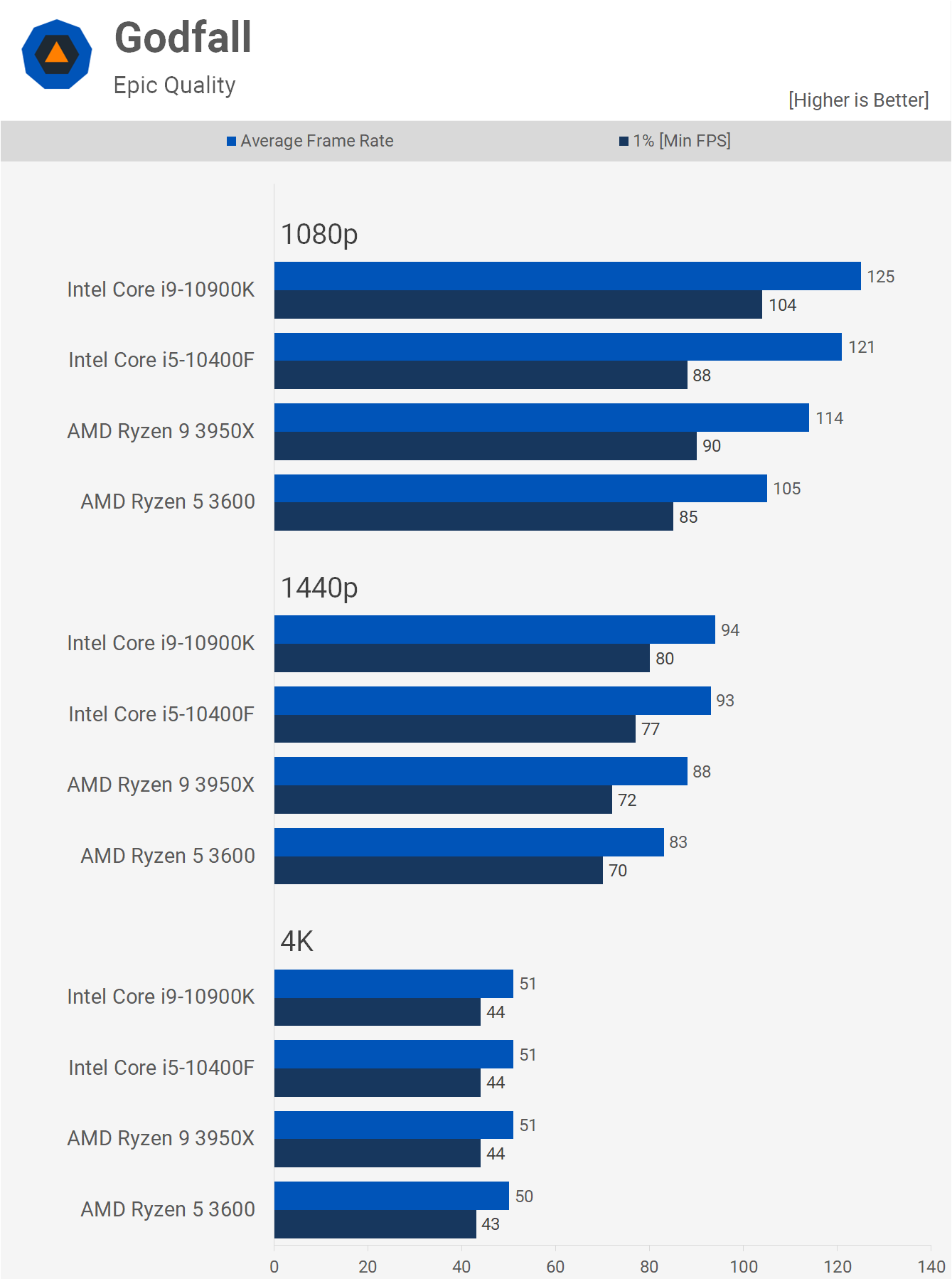
The margin is reduced slightly at 1440p, here the 10400F was 12% faster, delivering 10900K-like performance under these more GPU limited conditions.
Then at 4K we're looking at identical performance across the board.

Next up we have Watch Dogs: Legion and here the 10400F is roughly on par with the R5 3600 and just 9% slower than the 10900K at 1080p, while it was able to match it at 1440p and 4K.
Under realistic gaming conditions, which would see you playing at 1440p or higher, the 10400F is able to get the most out of the RX 6800.
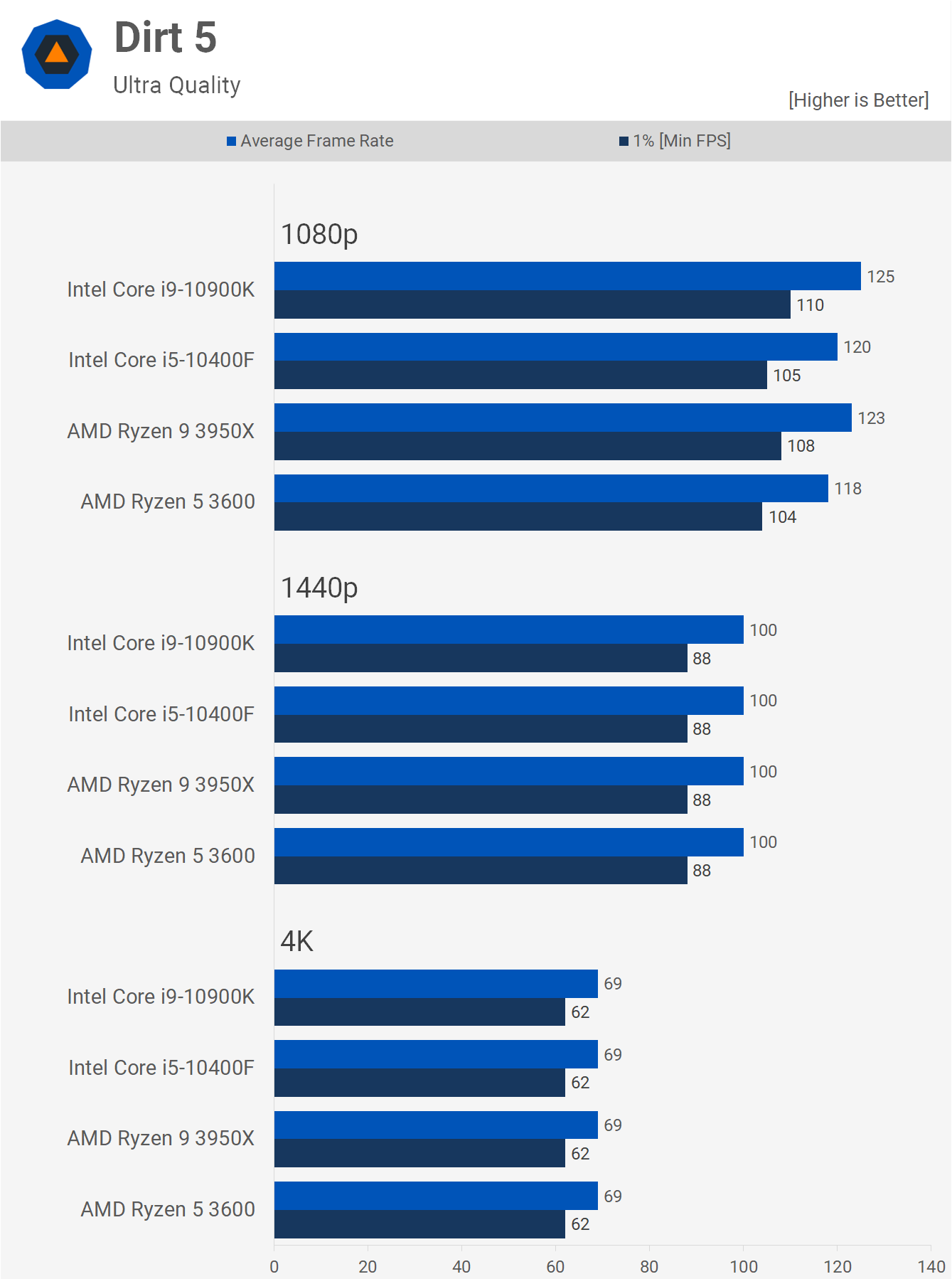
Performance in Dirt 5 is similar between the 10400F and 3600, both delivering similar performance to the flagship CPUs at 1080p and then identical performance at 1440p and 4K.
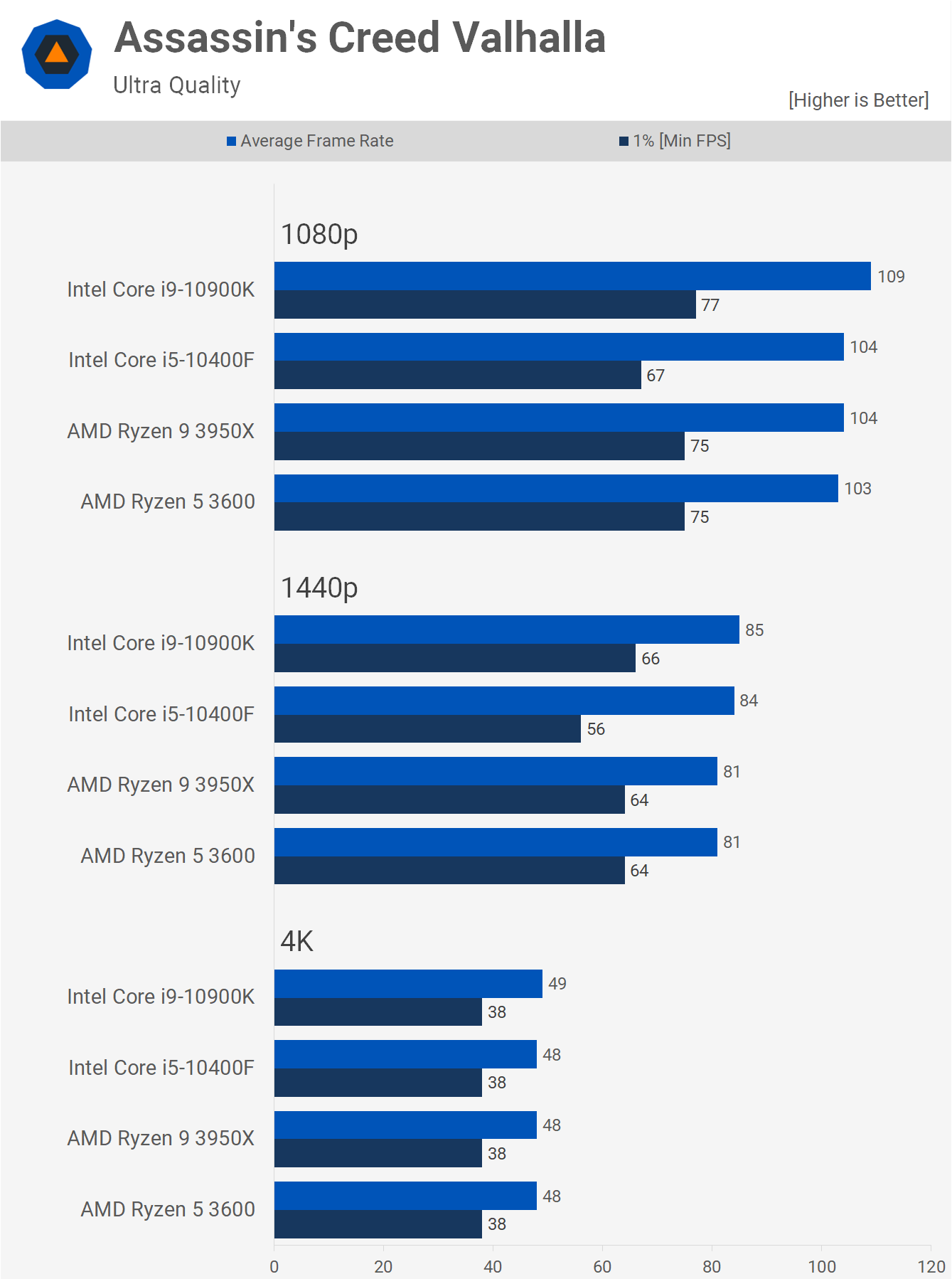
The 10400F also delivered comparable average frame rate performance in Assassin's Creed Valhalla though with a hit to 1% low performance, but the game still appeared to run smoothly. It is a little concerning to see a 13% reduction in 1% low performance at 1440p when compared to the Ryzen 5 3600.
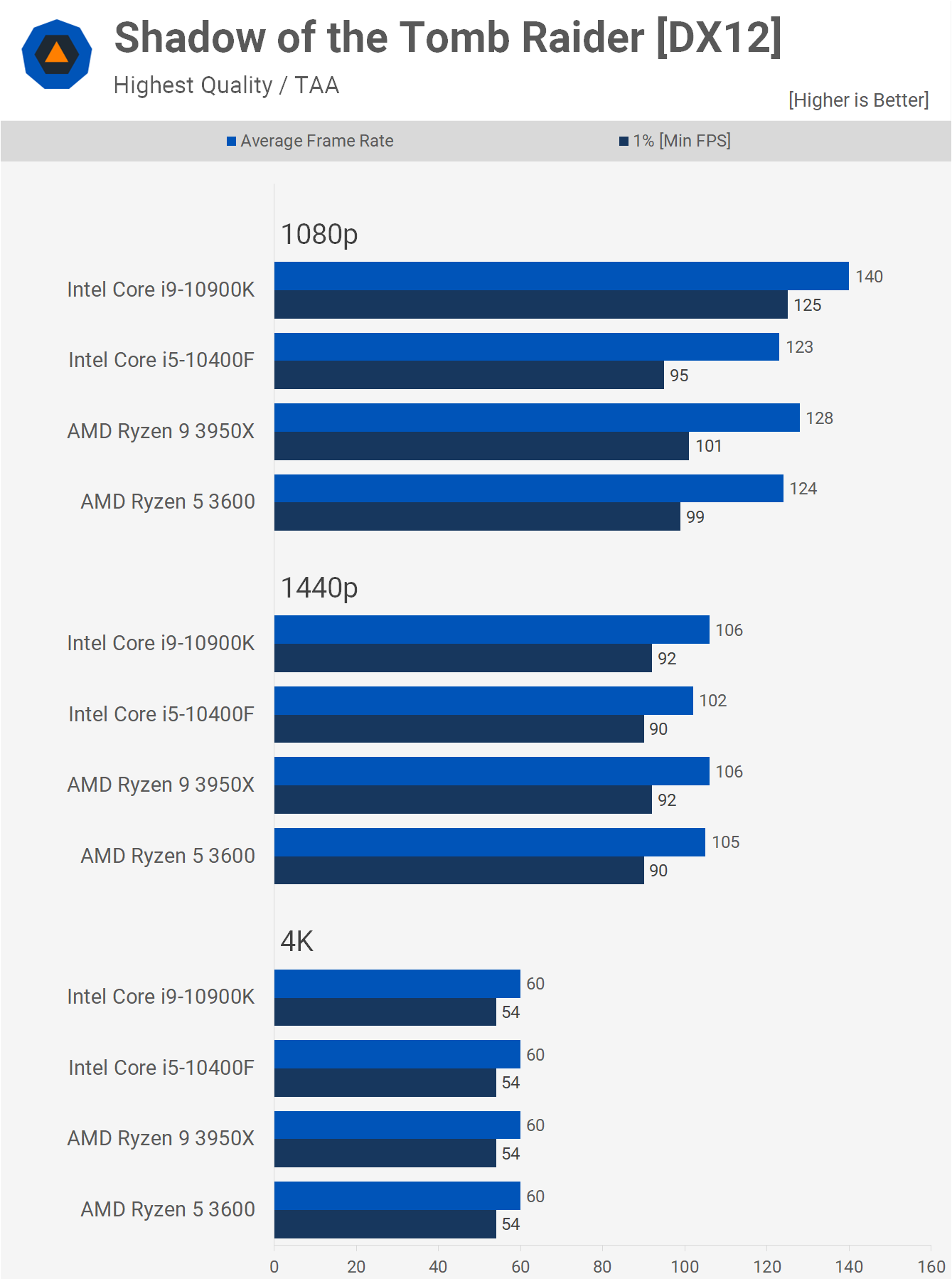
The Core i5-10400F performed very well in Shadow of the Tomb Raider, delivering comparable performance to the R5 3600 and while that meant the 1% low performance was well down on the 10900K at 1080p, performance was compatible at 1440p.
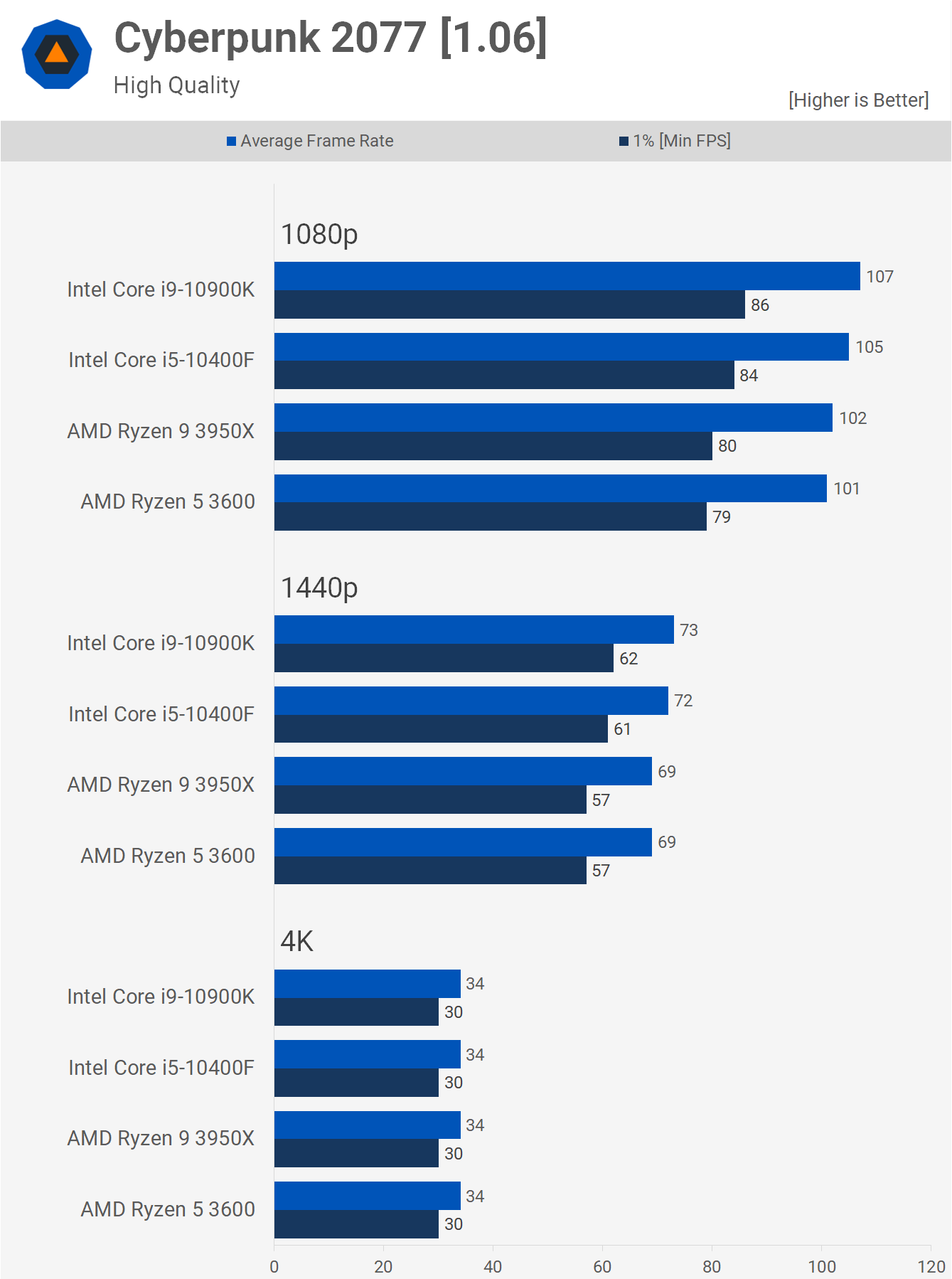
The 10400F performs well in Cyberpunk 2077, delivering performance near to that of the 10900K, even at 1080p, though so did the R5 3600.
Still, the 10400F was slightly better at 1080p and 1440p and while you won't notice the difference, it was faster.

For those seeking maximum performance at 1080p, the 10400F falls short, though I have to question how important the difference between the Core i5 and Ryzen 5 processors are here given we're at over 300 fps. Then at 1440p the performance margins are neutralized and the CPU becomes somewhat irrelevant.
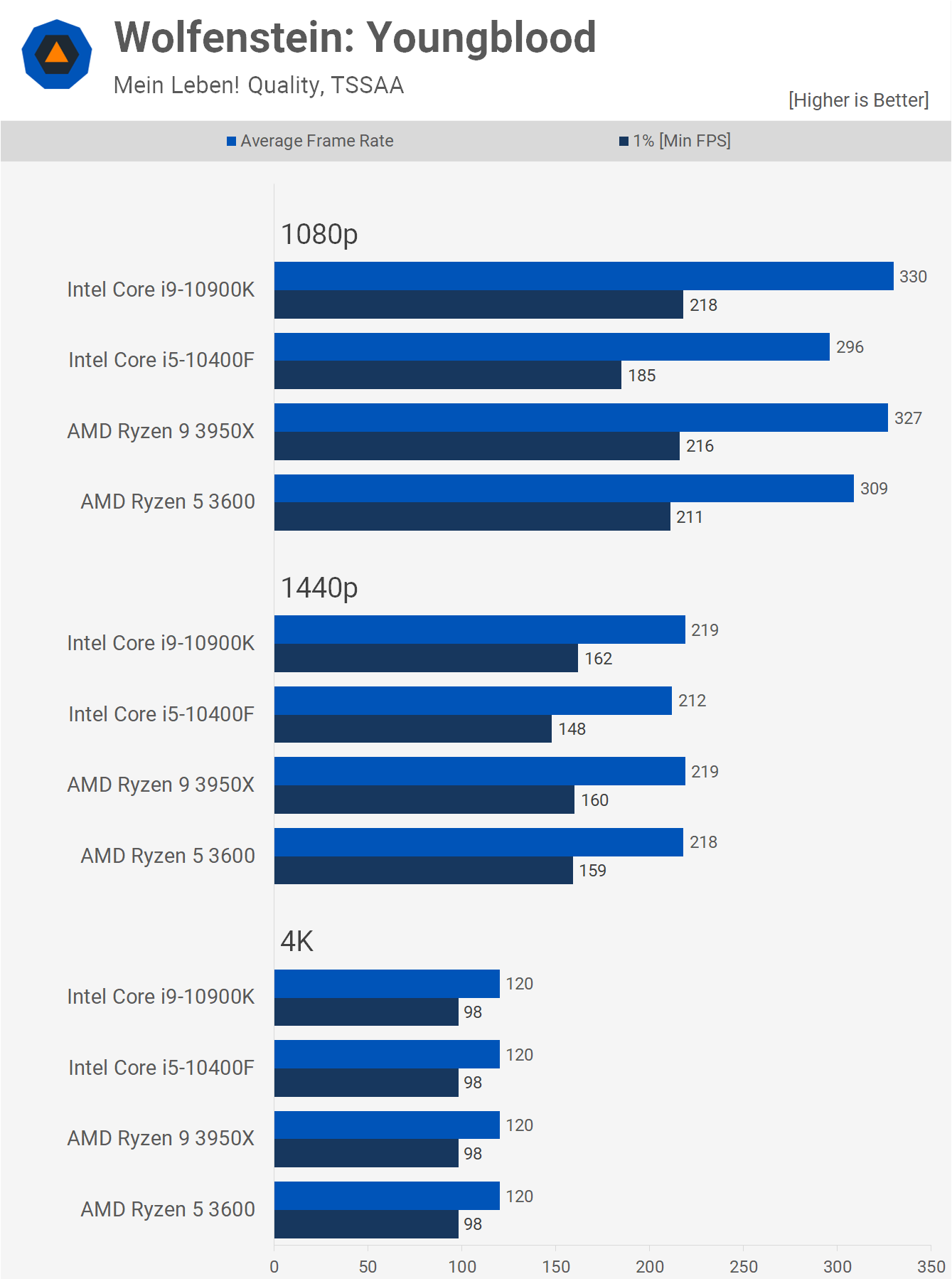
Another title where the 10400F lags behind a little at 1080p, but we're talking about almost 300 fps on average with a 1% low of almost 200 fps, so again I have to question how much this difference matters to most gamers. We're seeing very little difference at 1440p and no difference at 4K.

Moving on to F1 2020, where we see little difference in performance between all four test CPUs, the 10400F matched the 3950X at 1080p making it just 5% faster than the 3600, but with average frame rates over 200 fps there's little to be gained with a 5% boost.
The margins at 1440p are about the same, shrinking ever so slightly and then at 4K we're looking at identical results as the game becomes entirely GPU limited.
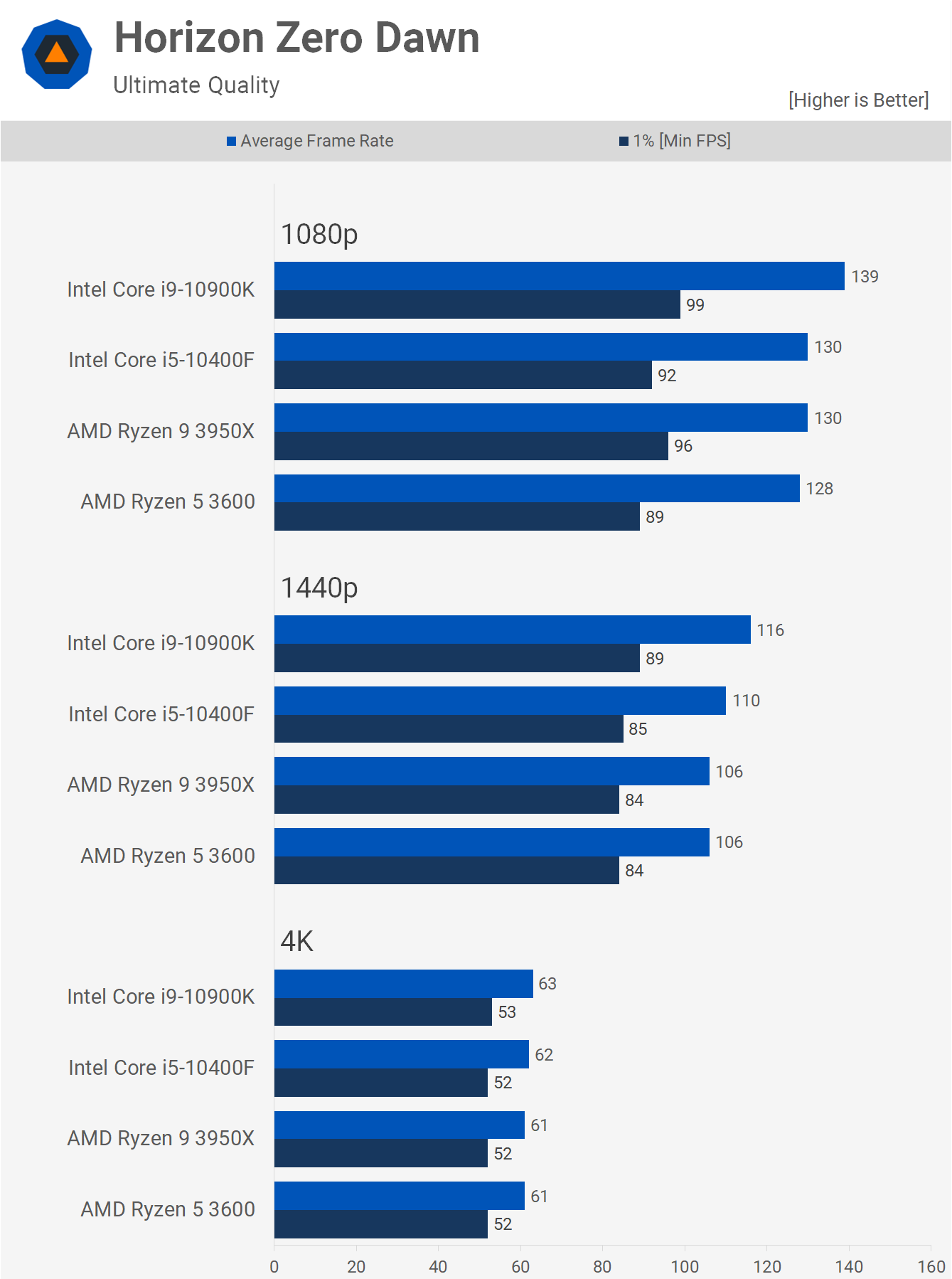
The 10400F is similar to the R5 3600 in Horizon Zero Dawn, making it just 6% slower than the 10900K at 1080p and 5% slower at 1440p. For the most part you're getting close to maxing out the RX 6800 with the Core i5 processor in this title.
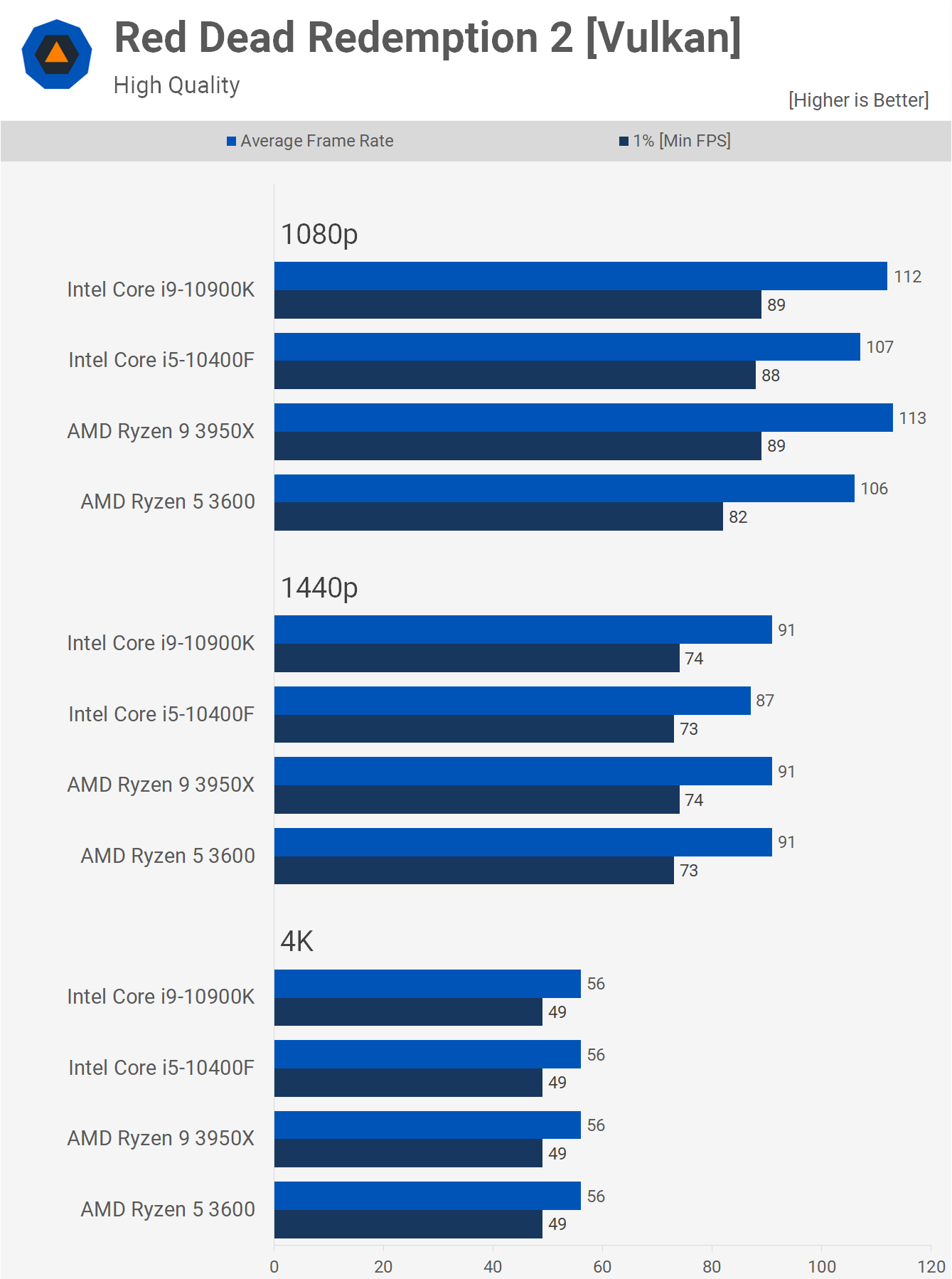
Yet another example where the 10400F isn't a great deal slower than the 10900K and is comparable to the R5 3600, this time in Red Dead Redemption 2.
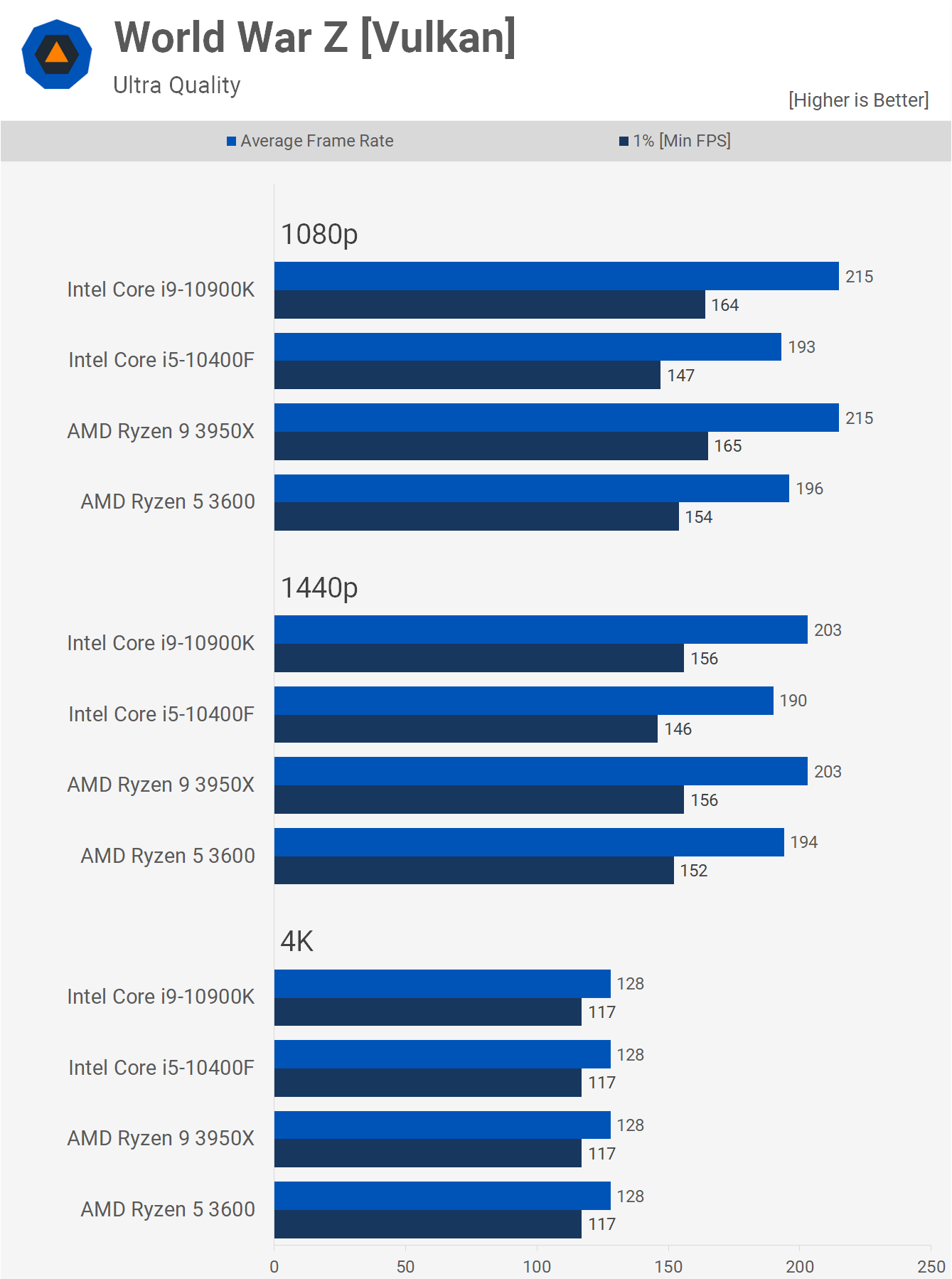
Moving on to World War Z, we see a slight reduction in performance with the Core i5 processor, though it was comparable to the R5 3600, making it 10% slower than the 10900K at 1080p.
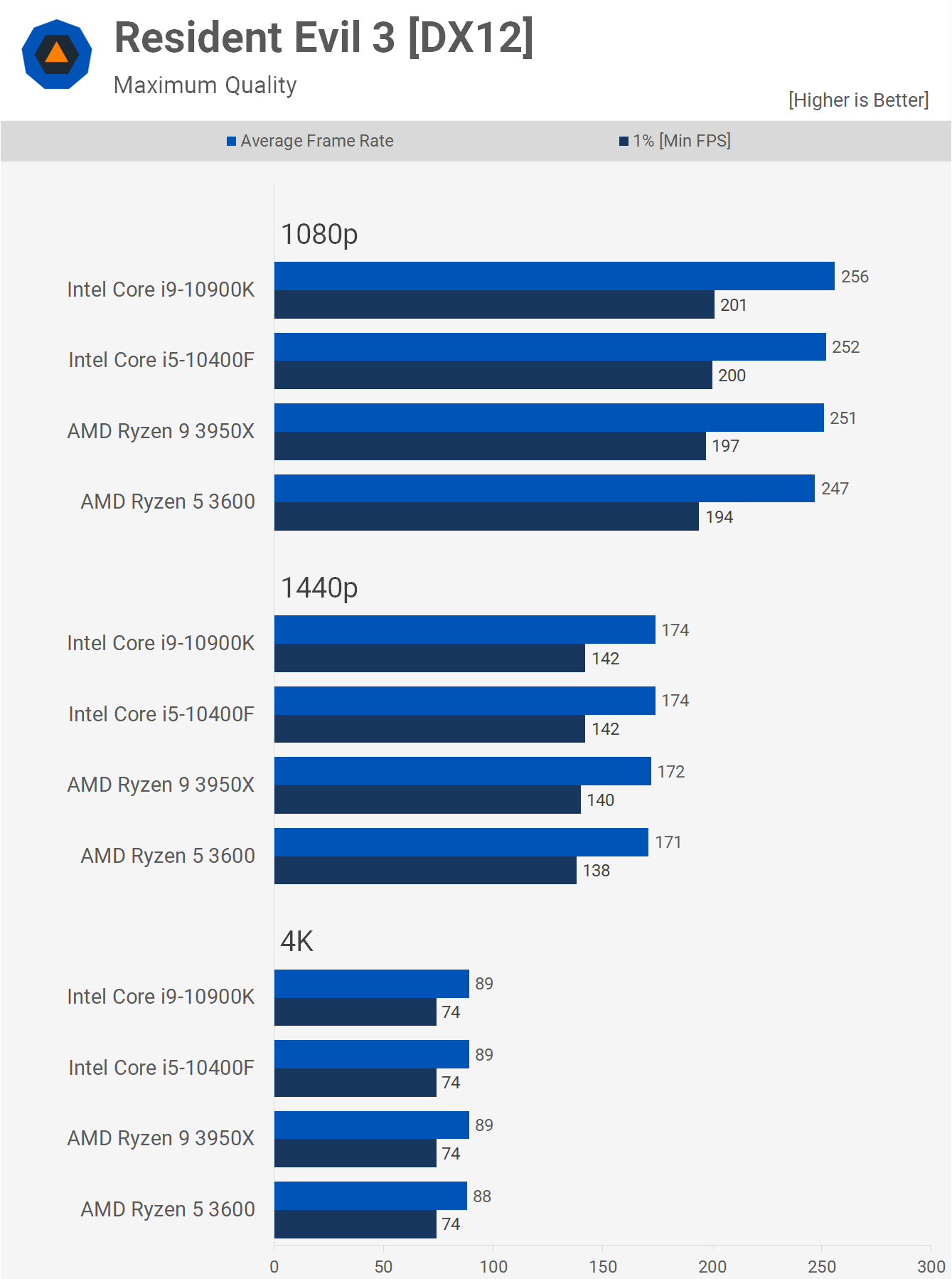
Resident Evil 3 isn't at all CPU intensive so performance is similar using all test CPUs. Basically the 10400F is no slower than the 10900K and is therefore able to extract maximum performance from the RX 6800.
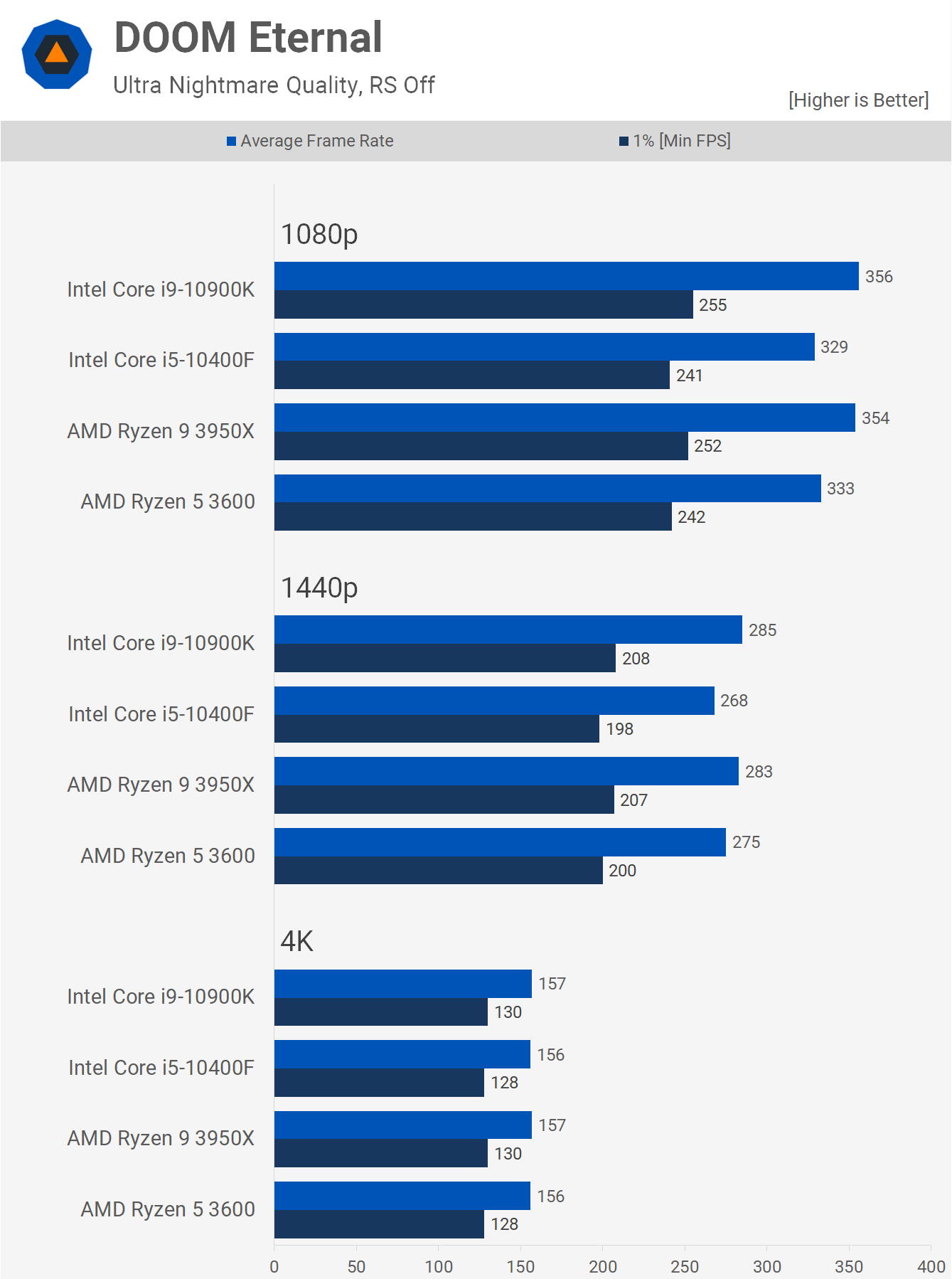
Doom Eternal is not particularly CPU intensive and as a result the 10400F and 3600 are evenly matched, trailing the 10900K by just 8% at 1080p and 6% at 1440p.

The Core i5-10400F scales better in Death Stranding than the R5 3600, delivering 18% more performance at 1080p, a significant performance uplift. That margin is reduced to just 2% at 1440p though.
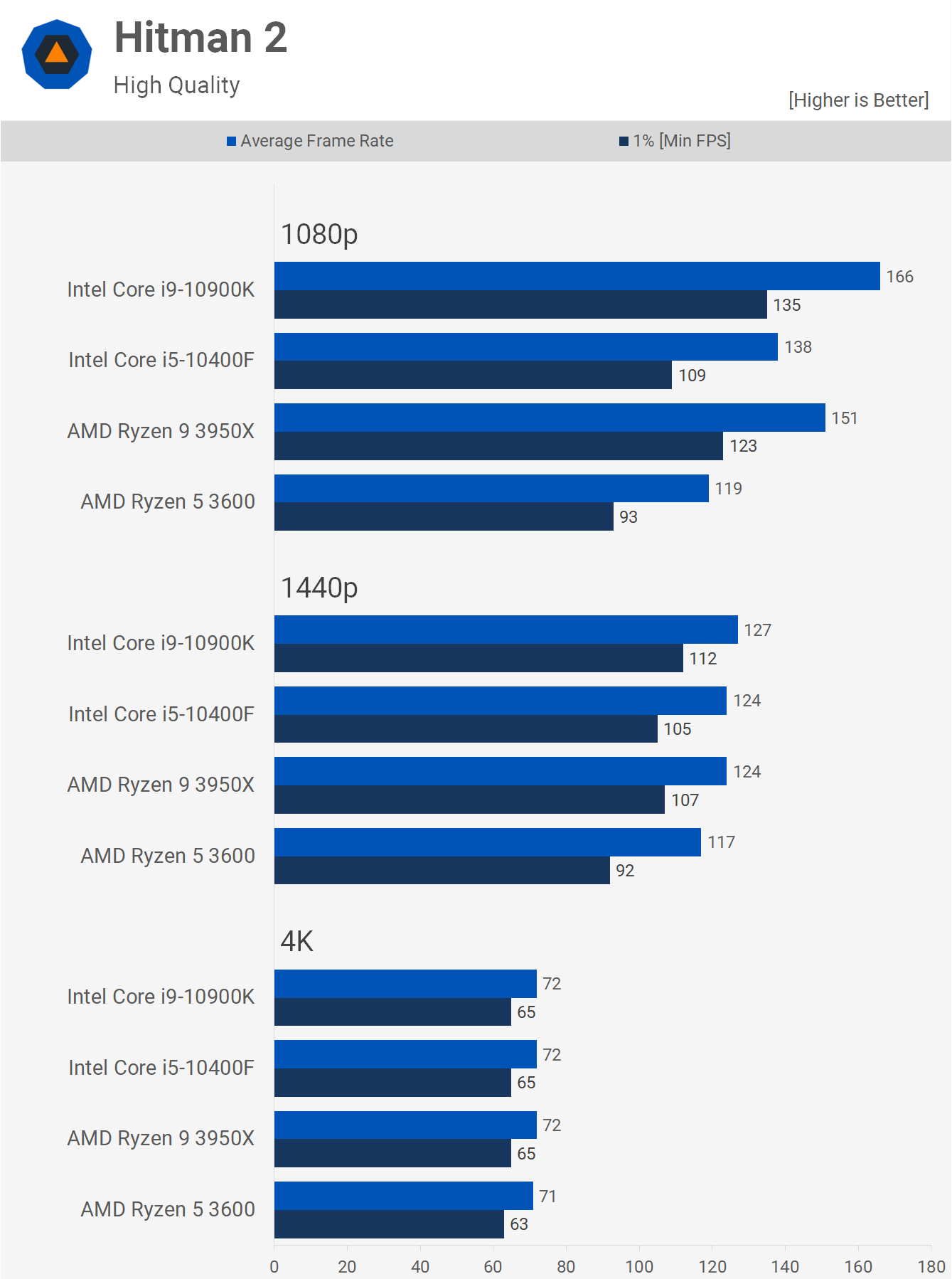
The 10400F also performs much better than the R5 3600 in Hitman 2 delivering 16% more performance at 1080p and up to 14% more at 1440p when comparing the 1% low results.

Unexpectedly the Core i5-10400F falls away a little in War Thunder and this is seen even at 1440p where it was 6% slower than the Ryzen 5 3600, not a terrible result but certainly weaker than expected given many of the other games we've already tested.
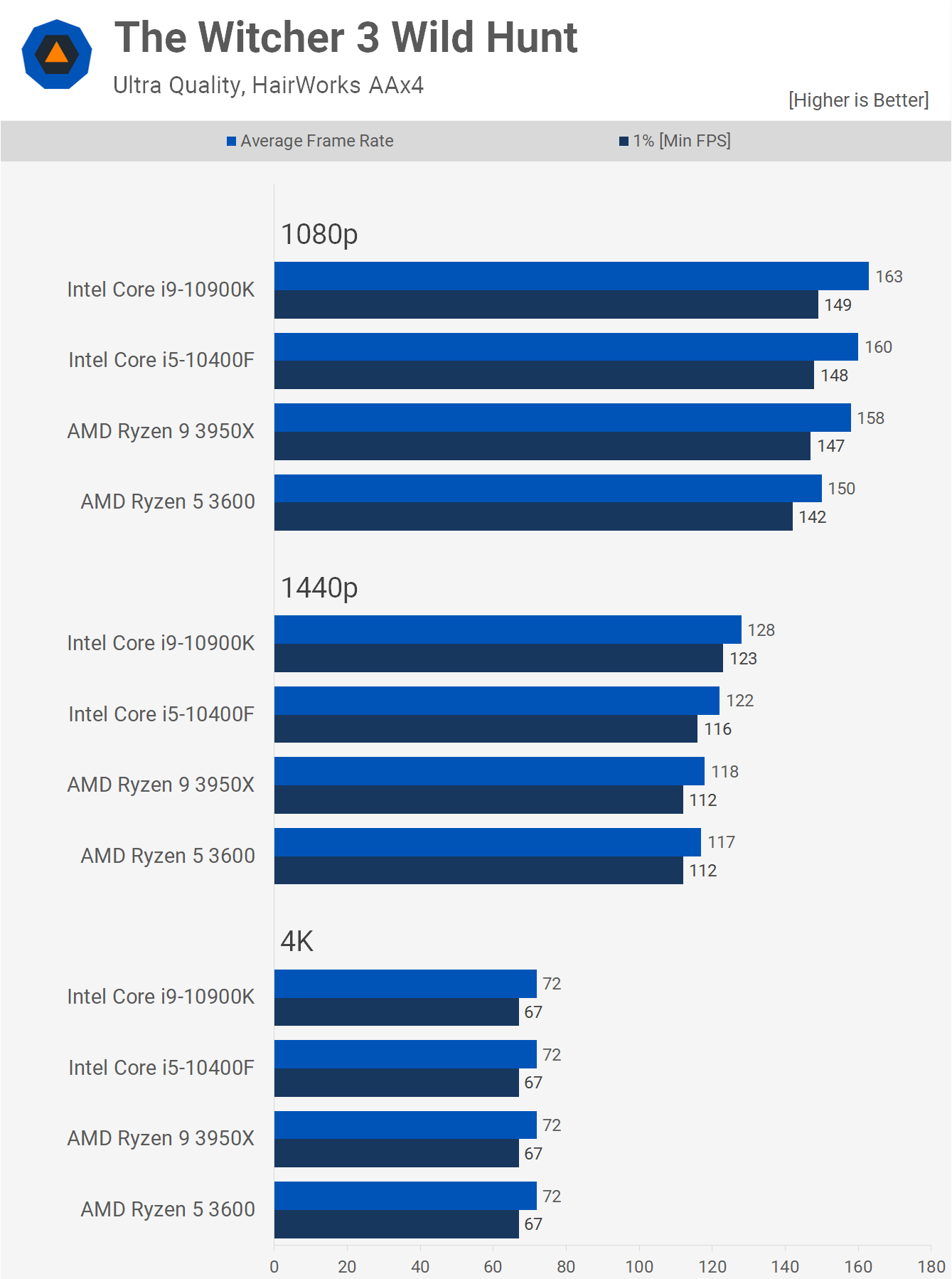
The 10400F performs well in The Witcher 3 Wild Hunt, trailing the 10900K by a slim margin. It was also 6% faster than the R5 3600 at 1080p, then 4% at 1440p.
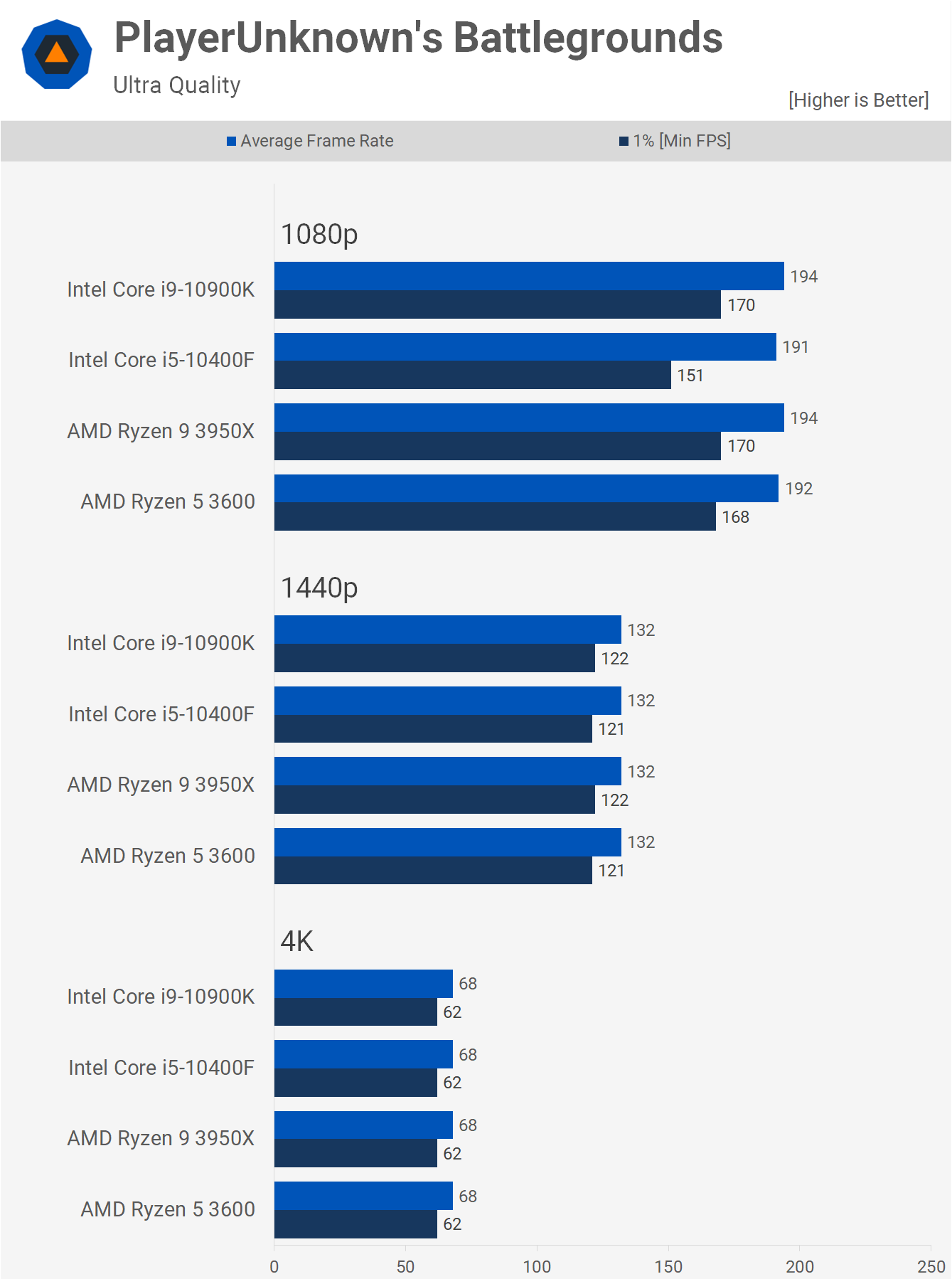
Frame rates are also similar in PUBG, the 10400F does trail a little at 1080p, particularly when looking at the 1% low data, but that difference is made up once we become GPU bound at 1440p.
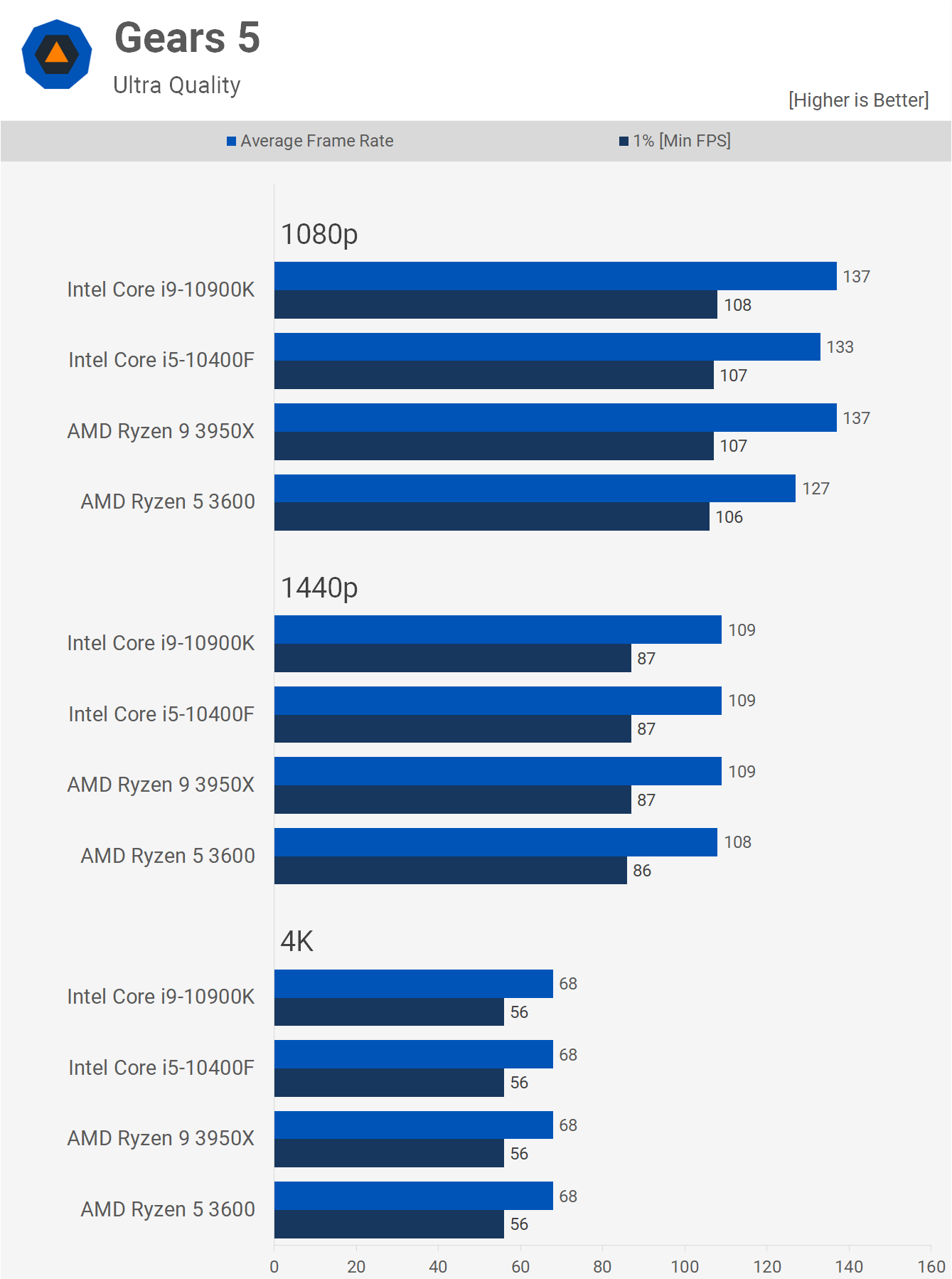
Finally, we have Gears 5 and here the 10400F is similar to the 10900K at 1080p and then by the time we reach 1440p all four CPUs are seen delivering the same kind of performance. So it doesn't matter which of these four CPUs you're using in Gears 5 with the RX 6800, performance is going to be much the same.
Performance Summary
That's all 21 games and as expected the Core i5-10400F performed well, delivering similar or slightly better performance than the Ryzen 5 3600. Let's now look at the FPS average to get a better idea of how they compared across this wide range of games.
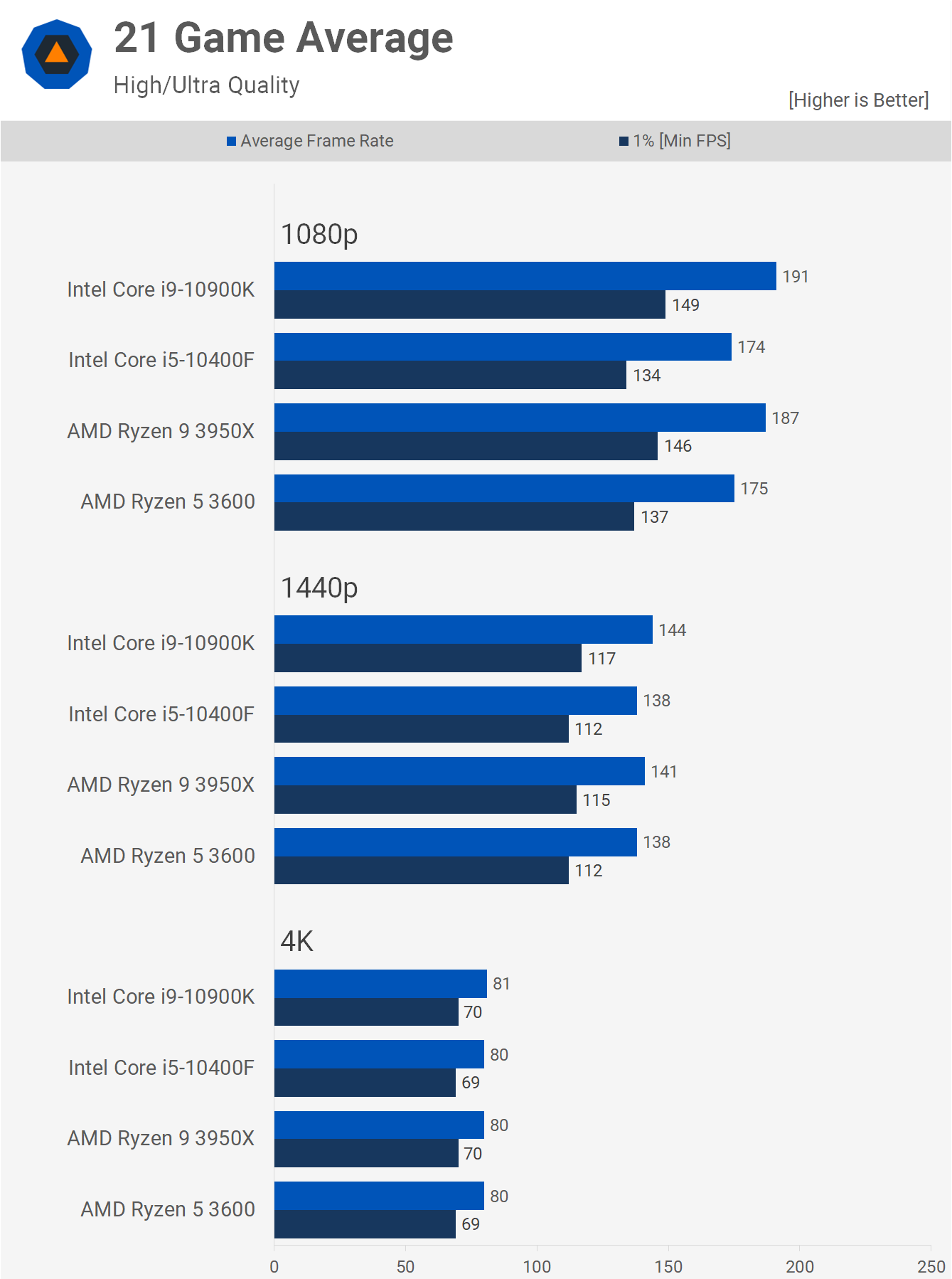
No real surprises here, the 10400F and 3600 are evenly matched, delivering around the same level of performance with the RX 6800 at 1080p, 1440p and 4K.
When compared to the 10900K they're ~9% slower at 1080p and just 4% slower at 1440p with no real difference at 4K. The low latency DDR4-3200 dual rank memory is likely helping out the 3600 a bit more than the 10400F, but either way, they're very close overall for gaming.
What We Learned
The Core i5-10400F is a very capable gaming CPU and an excellent value pairing for a high-end GPU such as the Radeon RX 6800.
Now, because the 10400 and 3600 were so evenly matched when we first reviewed the Core i5, we recommended the Ryzen CPU and we did so for a few reasons. First, the 3600 was slightly cheaper which wasn't a huge deal, but coupled with savings on cheaper B450 motherboards, the Ryzen 5 package was simply more cost effective.
The Ryzen 5 3600 on a B450 or newer motherboard also has a strong upgrade path. You upgrade to an 8, 12 or 16 core Zen 2 processor, but now also there's the option of higher IPC Zen 3 processors as well, scaling all the way up to 16 cores on the same motherboard. The R5 3600 is also typically a bit punchier in applications, so another plus there.
On the opposite side, the Core i5-10400F requires a Z490 motherboard for maximum performance as B and H-series boards will limit you to DDR4-2666, though realistically that's not a huge deal breaker as gaming performance will be the same for the most part. Overclocking is also off the table unless you have a Z-series motherboard.
Now, the most affordable Z490 motherboard that we'd bother with is the MSI Z490-A Pro at $160, which is not terrible, but you can get a higher quality B550 motherboard such as the MSI B550 Gaming Plus or Asus TUF Gaming B550-Plus for around $150. The MSI B550M Bazooka is also great value at $130.
So with the motherboard being up to $30 cheaper, you'll end up paying a similar amount for a Ryzen 5 3600 on a B550 board as you will the Core i5-10400F on a Z490 motherboard, at least assuming pricing in your region is similar to what we're seeing in the US at retailers such as Amazon or Newegg.
At the end of the day, once you factor in the cost of the motherboard both options end up costing roughly the same. You could save more by getting an Intel B460 board and opting for lower clocked memory, but you can do the same on the Ryzen side by buying an A520 or cheaper B450 motherboard.
Initially we thought the discounted Core i5-10400F would be the better buy, but after a complete analysis it turns out it's at best offering the same level of value as the Ryzen 5 3600.
The 3600 benefits from a superior upgrade path, support for PCIe 4.0 and overclocking B and X-series motherboards, so ultimately we think it remains the better value choice. We just can't let go that it's no longer available at an attractive discount (see our price tracker chart for more), but that's the world we live in right now.
Given the current pricing, we feel parts like the Core i5-10400F are certainly a viable alternative and if availability or pricing of Zen 2 CPUs is even worse in your region, then we wouldn't hesitate to snap up the Core i5 as we've seen it's a very capable processor. Sadly, while you can easily grab the 10400F, getting your hands on an RX 6800 graphics card is close to impossible, let alone getting one at a reasonable price.
